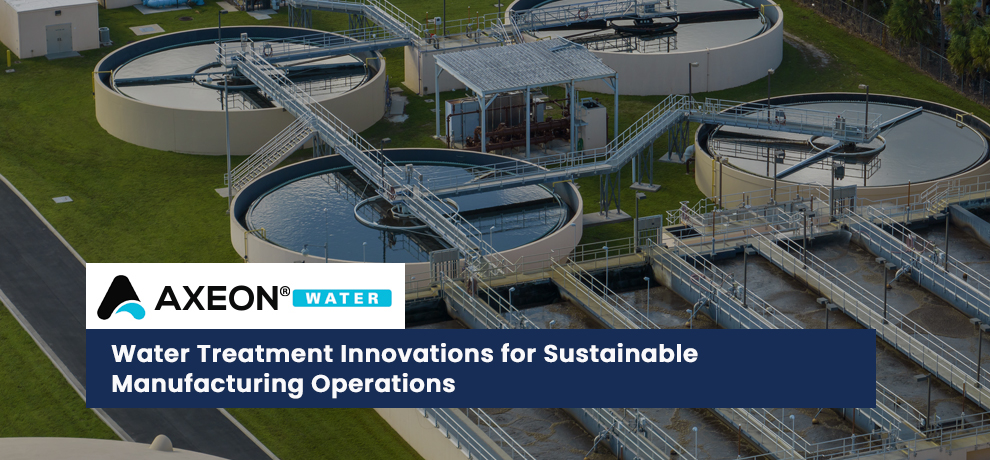Technical Articles

Water Treatment Innovations for Sustainable Manufacturing Operations
Water treatment innovations for sustainable manufacturing operations are advanced technologies and engineered processes that enable manufacturers to reduce water usage, improve water quality, and achieve regulatory compliance while maintaining operational efficiency. These include membrane systems such as reverse osmosis, ultrafiltration, and membrane cleaning; filtration systems like media and cartridge filtration; ion exchange methods including water softening, deionization, and electrodeionization; ultraviolet sterilization for disinfection; and automated chemical injection systems. Each of these solutions addresses specific water quality challenges in manufacturing environments, supporting sustainability goals and operational reliability.
Why Is Sustainable Water Treatment Essential in Manufacturing?
Sustainable water treatment is essential in manufacturing because it enables regulatory compliance, reduces operational costs, minimizes environmental impact, and extends equipment lifespan. Manufacturing operations account for over 20% of global water use and generate large volumes of wastewater, making efficient water management critical for meeting sustainability targets and resource conservation.
- Regulatory compliance with standards like the EPA and SDWA is required to avoid fines and maintain uninterrupted operations.
- Efficient water use lowers operational costs by reducing water procurement, energy consumption, and chemical usage.
- Clean water prevents scaling, corrosion, and equipment failure, which decreases maintenance costs and downtime while increasing productivity.
- Sustainable practices, such as water recycling and reuse, can reduce freshwater demand by up to 40% and support environmental stewardship.
- Meeting sustainability goals improves corporate reputation and aligns with customer and stakeholder expectations for responsible manufacturing.
What Are the Key Water Treatment Innovations in Manufacturing?
Key water treatment innovations in manufacturing are membrane filtration systems, advanced filtration, ion exchange, ultraviolet disinfection, and automated chemical injection. These technologies enable precise water quality control, support water reuse and recycling, and facilitate zero-liquid discharge initiatives. Membrane systems, such as reverse osmosis and ultrafiltration, remove dissolved solids and contaminants. Advanced filtration systems, including media and cartridge types, capture particulates and protect downstream equipment. Ion exchange processes, like deionization and water softening, ensure water meets strict purity standards. Ultraviolet sterilization provides effective, chemical-free disinfection. Automated chemical injection systems optimize dosing and maintain consistent water quality. These innovations address the evolving demands of sustainable manufacturing operations by improving efficiency and compliance.
How Do Membrane Systems Support Sustainable Manufacturing?
Membrane systems deliver high-efficiency water purification that enables water reuse and reduces wastewater discharge in manufacturing operations. Reverse osmosis (RO) systems, including tap water RO, brackish water RO, and seawater RO, remove up to 99% of dissolved solids and contaminants, supporting both process water and ultrapure water needs. Ultrafiltration systems remove suspended solids and pathogens, improving water quality for sensitive applications. Membrane cleaning systems maintain optimal performance and extend membrane lifespan, reducing operational costs. Mobile and containerized membrane systems provide flexible solutions for remote or temporary manufacturing sites. These innovations help manufacturers meet strict water quality standards, lower water consumption by up to 60%, and support circular water management strategies.
What Role Do Filtration Systems Play in Manufacturing Operations?
Filtration systems remove particulates, suspended solids, and targeted contaminants from process water, protecting equipment and ensuring consistent water quality. Media filtration systems capture larger particles, while cartridge filtration systems target fine particulates. These technologies reduce maintenance costs by preventing clogging and wear in downstream equipment. Consistent filtration supports product quality in industries such as food processing, metal finishing, and pharmaceuticals, where even minor impurities can impact outcomes. Filtration systems also help manufacturers meet discharge standards and improve operational efficiency by minimizing downtime and extending equipment lifespan.
How Is Ion Exchange Used in Water Treatment for Manufacturing?
Ion exchange systems remove hardness, minerals, and dissolved ions from water, ensuring it meets strict process requirements for manufacturing operations. Water softening systems exchange calcium and magnesium ions to prevent scale buildup in equipment. Deionization and electrodeionization systems eliminate dissolved salts and impurities, producing high-purity or ultrapure water for sensitive industries such as pharmaceuticals, microelectronics, and power generation. For example, deionization can achieve resistivity levels above 18 megohm-cm, critical for semiconductor manufacturing. Ion exchange systems support regulatory compliance, reduce maintenance costs, and improve product quality by maintaining consistent water chemistry in demanding industrial applications.
What Are the Benefits of Ultraviolet Sterilization in Manufacturing Water Treatment?
Ultraviolet sterilization systems provide chemical-free disinfection by inactivating up to 99.99% of bacteria, viruses, and other pathogens in process and potable water streams. UV technology ensures microbiological safety, supports compliance with health regulations, and maintains product integrity in manufacturing, food processing, and pharmaceutical operations.
How Do Chemical Injection Systems Enhance Water Treatment Processes?
Chemical injection systems automate the precise dosing of antiscalants, coagulants, and disinfectants, increasing process efficiency and ensuring stable water quality. Automated dosing reduces manual intervention, supports consistent compliance with regulatory standards, and minimizes chemical waste. These systems are used in manufacturing operations to prevent scaling, control microbial growth, and optimize pH levels, directly protecting equipment and improving operational reliability.
How Do Innovative Water Treatment Technologies Address Manufacturing Pain Points?
Innovative water treatment technologies address manufacturing pain points by increasing water efficiency, reducing unplanned downtime, enabling water reuse, and ensuring compliance with evolving environmental regulations. Real-time monitoring and data analytics provide early detection of system issues, allowing for proactive maintenance and process optimization that minimizes operational disruptions.
- Integrated membrane and filtration systems reduce scaling, fouling, and corrosion, which extends equipment lifespan and lowers maintenance costs.
- Water reuse and recycling technologies decrease reliance on freshwater sources and minimize wastewater discharge, supporting sustainability targets and cost savings.
- Automation and digital monitoring enable data-driven decision-making, simplify regulatory reporting, and ensure consistent water quality across manufacturing operations.
These solutions help manufacturers maintain productivity, manage resources efficiently, and meet both internal and external sustainability commitments.
What Are the Latest Trends in Water Treatment for Sustainable Manufacturing?
The latest trends in water treatment for sustainable manufacturing are digitalization, modular system design, advanced monitoring, and circular water management. Manufacturers are adopting IoT-enabled sensors and real-time analytics to monitor water quality and system performance, which improves compliance and operational efficiency. Modular water treatment systems allow rapid deployment and easy customization for diverse manufacturing needs, reducing installation time and costs. Circular water strategies, such as closed-loop reuse and zero-liquid discharge, help maximize water reuse and minimize waste, supporting both sustainability goals and regulatory requirements.
- Digital tools provide real-time insights into water quality and system performance, enabling predictive maintenance and faster response to issues.
- Modular systems enable rapid deployment and customization for specific manufacturing needs, offering scalability and flexibility.
- Circular water strategies focus on maximizing water reuse and achieving zero-liquid discharge, reducing environmental impact, and operational expenses.
How Do Water Treatment Innovations Contribute to Environmental Sustainability?
Water treatment innovations contribute to environmental sustainability by reducing water consumption, minimizing waste, and supporting compliance with environmental regulations. Advanced water reuse systems can lower freshwater withdrawal by up to 60% in manufacturing applications, directly conserving local water resources. Membrane and filtration technologies enable the recovery of valuable byproducts and reduce the volume of waste requiring disposal. Meeting effluent discharge standards protects aquatic ecosystems and community health by ensuring treated water meets strict quality parameters before release.
- Water reuse systems reduce freshwater withdrawal by up to 60% in process industries.
- Advanced filtration and membrane systems enable recovery of byproducts, such as nutrients or energy, from wastewater streams.
- Compliance with effluent discharge standards prevents environmental contamination and supports sustainable development goals.
Manufacturers adopting these innovations demonstrate leadership in resource conservation and corporate responsibility, strengthening both operational resilience and public trust.
What Are Examples of Water Treatment Solutions for Manufacturing Operations?
Examples of water treatment solutions for manufacturing operations include tap water reverse osmosis (RO) systems, brackish RO systems, ultrafiltration, media filtration, deionization, ultraviolet (UV) sterilization, and chemical injection systems. These technologies are engineered to address diverse manufacturing needs, from food and beverage to pharmaceuticals and electronics.
The table below defines each solution, its typical application, and its primary benefit:
TABLE
These solutions support operational efficiency, regulatory compliance, and product quality across manufacturing sectors by targeting specific water quality challenges and process requirements.
How Should Manufacturers Select the Right Water Treatment Company?
Manufacturers select the right water treatment company by prioritizing proven expertise, advanced technology, industry certifications, and strong customer support. Key criteria include a track record in manufacturing and industrial water treatment, ISO:9001 or equivalent certifications, customized engineering capabilities, comprehensive after-sales support, and the ability to address regulatory and operational challenges for specific industries. Reviewing case studies, customer testimonials, and sustainability credentials further ensures reliability and alignment with long-term operational goals.
What Is the Future Outlook for Water Treatment Innovations in Manufacturing?
The future outlook for water treatment innovations in manufacturing is increased automation, artificial intelligence integration, and a stronger focus on measurable sustainability metrics. Manufacturers are adopting data-driven technologies to optimize water use, ensure compliance, and enhance resource conservation across global operations.
THE RIGHT SOLUTION FOR YOU
Contact us today for more information about our products and services.
CONTACT US
